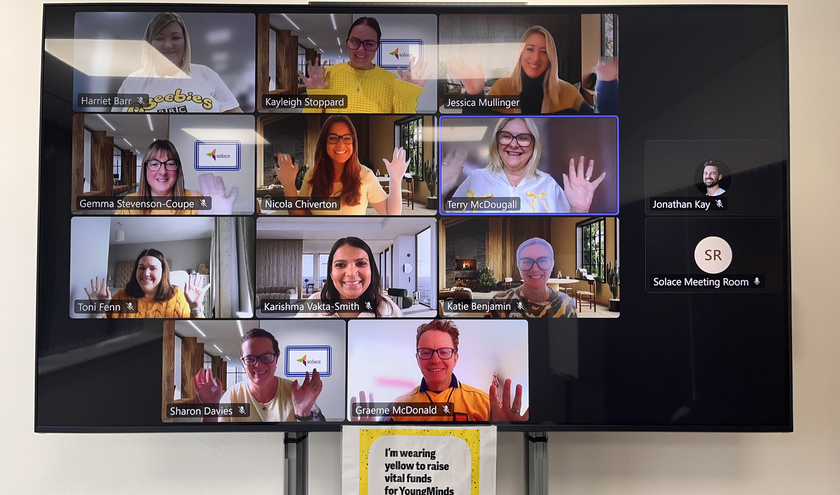This week at Solace we are wearing yellow (and eating yellow lemon drizzle cake!) in support of one of one of our key charities, Young Minds. Their Hello Yellow Day is designed to support and promote World Mental Health Day on Friday 10th November.
Under this spotlight my thoughts turn to the mental wellbeing of our Solace network and the many senior leaders in local government, who are going through another intense period of change.
From our recent conversations across the sector, it is evident that the additional burden of local government reorganisation (LGR) and devolution is weighing heavily on many leaders, who are carrying not only the pressure of organisational responsibility but also the weight of public scrutiny, political complexity, and staff expectations, as well as their own career uncertainty. At this time, it's essential – but often neglected – for leaders to actively protect and sustain their own well-being.
It's important to recognise that wellbeing is part of leadership, not separate from it. Wellbeing isn't a luxury or a sign of weakness. It's core to decision-making, judgement, resilience, and credibility.
The Local Government Association (LGA) identifies six skills, values and behaviours required of leaders, now and in the future, and personal resilience and wellbeing is top of that list. Leaders who model self-awareness and self-care create cultural permission for others to do the same.
Modelling wellbeing isn't always easy; it takes purposeful and sustained effort. My own journey in this regard has certainly had its challenges. Growing up in the 80s, my physical wellbeing was prioritised. I spent most days at swimming, gymnastics or dance…and all on a (very) healthy diet. Mental wellbeing however wasn't a topic up for discussion. It wasn't discouraged necessarily – it was just absent.
In this context, the benefits of raising awareness of mental health and normalising the conversation, become clear. Over the years, through many conversations with friends, family and colleagues I have learnt to develop empathy and compassion, not just for others but crucially for myself. Without this focus on my own mental health, I believe that developing a culture which supports and promotes well-being would be almost impossible.
We've all heard the adage, put your own mask on first before helping others, so if you're leading through LGR, devolution, or any other major change, what steps can you take to protect your mental health?
Reconnect with core purpose and values
When everything is changing, what remains constant is why you do the work. Revisit core values and your ‘why' – for example, service to community, improving lives, delivering fairness. Use these as guideposts to make decisions easier, especially when resource constraints force trade offs.
Cultivate peer and external support
Seek out groups of peers with whom you can discuss not just strategy but struggles. Peer networks like Solace, LGA and ALACE can reduce isolation. At Solace we host regional, national and online events and programmes to promote peer-to-peer support and learning. Through the LGA's devolution and LGR hub you can access several convening networks, aimed at creating a collaborative space for council officers involved in local government reorganisation.
Consider using an external mentor or coach to get perspective on both what you can't control and how to manage what you can. A transition coach can support you in making decisions about your own future, and doing this work now will enable you to lead authentically from a position of improved personal stability.
Monitor your load and delegation
Be conscious of how many roles you are fulfilling – strategy, crisis management, mediation, public face and political interface. Offloading non core tasks (even imperfectly) helps. Empower your senior team: define clear responsibilities, delegate authority, provide support so others can act. Make sure you buffer your own capacity.
Be aware of your limits and closely monitor for signs of stress. Consider bringing in an injection of external support, either to deliver business-as-usual or to support with change. An experienced interim manager can bring a wealth of experience and a calm, steady hand during periods of change.
Push for organisational enablers of wellbeing
Promote organisational investment in leadership development, skills support, and resilience training. Ensuring your workforce is ready for change and has the necessary skills to move forward, will enhance the stability of your workforce and your organisation, which in turn will protect your own mental well-being.
Encourage a culture that normalises discussing stress, failure, limits – not just celebrating wins and encourage organisation-wide initiatives to promote and enhance mental well-being. There are many such initiatives across the sector, but the Public Sector Challenge is a superb example.
As an inclusive and accessible initiative that provides a range of physical challenges throughout the year, the PSC gives individuals a common purpose and an opportunity raise funds for important charities, whilst also promoting physical exercise, mental resilience, social connection, connectivity and teamwork – a all the components for enhanced mental well-being.
Senior leaders in local government are not just managers or strategists – they are emotional and organisational linchpins in times of change. We know that many are stretched, working under uncertainty, with gaps in capacity, skills, and morale.
Protecting wellbeing isn't about self indulgence – it's essential for maintaining judgment, resilience, sustainability, and leadership credibility. For councils and associated bodies, this means supporting leaders with peer relationships, purpose anchoring, role clarity, boundaries, and systems that reduce friction.
In a sector where resources are tight and expectations high, making space for wellbeing is a strategic act – and one whose returns are felt not just by individual leaders, but by staff, service users, and communities alike.
Jessica Mullinger is director of interim management at Solace in Business


